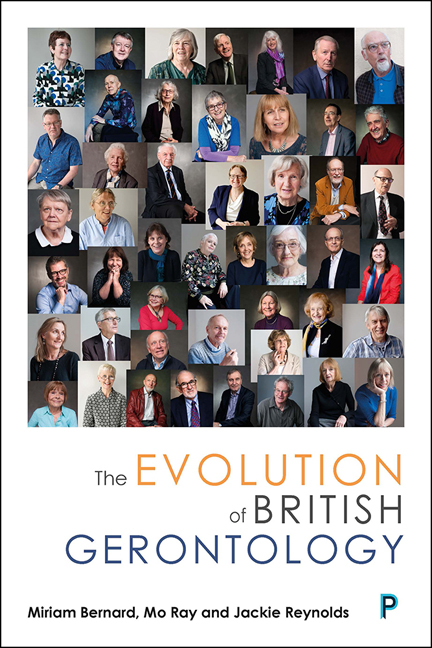Book contents
- Frontmatter
- Dedication
- Contents
- Acknowledgements
- PART I The Ageing of British Gerontology
- PART II Learning from the Past
- PART III Lives and Careers in Gerontology
- PART IV Informing the Future
- Appendix 1: Timeline: Policies, Research Programmes, Organisations and key Events
- Appendix 2: Conference themes, sub-themes and Selected Topics, 1971– 2018
- Bibliography
- Index
8 - New Directions for Gerontology
Published online by Cambridge University Press: 25 February 2021
- Frontmatter
- Dedication
- Contents
- Acknowledgements
- PART I The Ageing of British Gerontology
- PART II Learning from the Past
- PART III Lives and Careers in Gerontology
- PART IV Informing the Future
- Appendix 1: Timeline: Policies, Research Programmes, Organisations and key Events
- Appendix 2: Conference themes, sub-themes and Selected Topics, 1971– 2018
- Bibliography
- Index
Summary
Introduction
This final chapter summarises and reflects further on the issues raised throughout the book. In so doing, our intention is to provide a basis for continued conversation and dialogue among and between all manner of gerontologists; between gerontologists, older people, practitioners and policy makers; and between gerontology and the many disciplines, organisations and groups that are now taking an interest in ageing and later life. We begin by reappraising what has been learnt from the analyses of the extensive archival and interview material from the project; consider how far gerontology has come and what it has achieved; and highlight the continuing concerns and challenges faced by gerontology and the gerontology community. The chapter then goes on to articulate the avenues for further research raised by our participants, as well as the key messages and advice they have for careeryoung colleagues. We conclude by offering a number of suggestions around which continued conversation and dialogue might happen.
Gerontology and gerontologists
The labels ‘gerontology’ and ‘gerontologists’ have been used throughout the book as umbrella terms for the subject matter and the people at the centre of our concerns. However, debates about the boundaries and territory of gerontology have a long history, and whether or not it is a distinct academic discipline in its own right, or a field of study, is still a matter of controversy (Lowenstein, 2004). Even among project participants, there is no agreement. While Tom Kirkwood feels that “people have better recognition of the term[s] “ than 20 years ago, others feel they are off-putting and need explaining. This is a problem for academics and academic institutions, for funders and, indeed, for other stakeholders and the general public, many of whom are simply baffled by the terms.
However, what we have seen is that the growth of inter-and multidisciplinary approaches has been key to gerontology's evolution and a response to the unprecedented social, economic and demographic changes that took place over the course of the 20th century (de Medeiros, 2017). Metchnikoff himself recognised that ageing and old age were issues of such scope and importance that a willingness to cross disciplinary and intellectual boundaries was vital.
- Type
- Chapter
- Information
- The Evolution of British GerontologyPersonal Perspectives and Historical Developments, pp. 213 - 238Publisher: Bristol University PressPrint publication year: 2020

